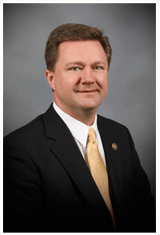JEFFERSON CITY, Mo. — Both chambers in the Missouri General Assembly have passed a version of the massive rewrite to the state’s criminal code, and sending it to Gov. Jay Nixon’s desk is mostly a matter of reconciling small differences according to bill sponsors and stakeholders.
Sen. Bob Dixon, R-Springfield, says the differences between the two bills are more minimal than people realize, and that all the major hurdles have already been cleared.
“It’s a matter of reconciling differences, but not differences that are substantive in any way,” Dixon said. “We’ll be meeting this week to make decisions about which vehicle to send [to Nixon].”

The bill started at almost 800 pages. A few weeks ago, Nixon issued a statement saying he was concerned with the length of the bill and would prefer a package of smaller legislation. Sponsors responded by retooling changes made to the felony classification portion of the bill.
Originally the code was going to reflect five classes of felonies with five letters from A thru E. The Senate language still reflects 5 classes of felonies, but does so with only 4 letters, dividing class C felonies into levels I and II. That change alone carved more than 300 pages from the bill. The body also reached a compromise on marijuana, removing criminal charges for first-time offenders possessing marijuana, but mandating a fine instead. The final bill also has no sections dealing with firearm crimes. Dixon’s office says this is because gun law changes in the state almost every year and the reorganization portion of the run-related code could be added to future gun legislation.
“Democrats and Republicans are energized to do this,” Dixon said. “And we appreciate the expertise and time the Governor is dedicating to it, but we would welcome any other input. Dividing this up or making it into smaller bills, it’s simply not an option, there are things we are trying to do here between and across sections and it simply can’t be done.”
Dixon says meetings are taking place this week to decide which bill will be advanced as the language intended for Nixon. In the Senate, only 3 members voted against the language and the House bill passed with 130 votes, both wide margins for such a large bill.
Nixon has not yet commented on the smaller version of the bill, or whether he was more or less likely to sign it with the recent changes. But with strong backing from prosecuting attorneys, sheriffs, police departments, and the general assembly, mounting pressure would suggest that vetoing the bill based on its length is not a likely scenario for Governor.
Collin Reischman was the Managing Editor for The Missouri Times, and a graduate of Webster University with a Bachelor of Arts in Journalism.



